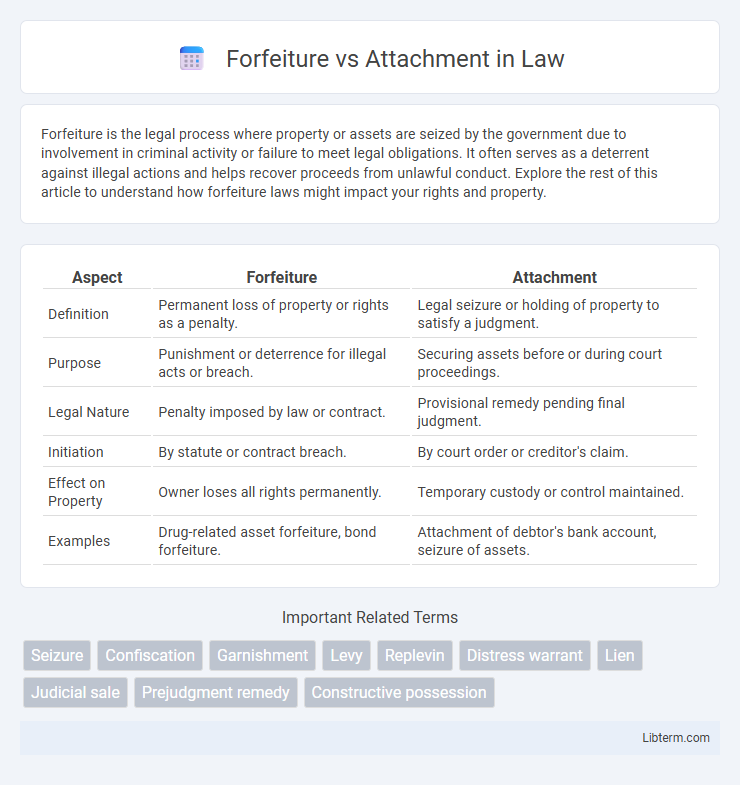Forfeiture is the legal process where property or assets are seized by the government due to involvement in criminal activity or failure to meet legal obligations. It often serves as a deterrent against illegal actions and helps recover proceeds from unlawful conduct. Explore the rest of this article to understand how forfeiture laws might impact your rights and property.
Table of Comparison
| Aspect | Forfeiture | Attachment |
|---|---|---|
| Definition | Permanent loss of property or rights as a penalty. | Legal seizure or holding of property to satisfy a judgment. |
| Purpose | Punishment or deterrence for illegal acts or breach. | Securing assets before or during court proceedings. |
| Legal Nature | Penalty imposed by law or contract. | Provisional remedy pending final judgment. |
| Initiation | By statute or contract breach. | By court order or creditor's claim. |
| Effect on Property | Owner loses all rights permanently. | Temporary custody or control maintained. |
| Examples | Drug-related asset forfeiture, bond forfeiture. | Attachment of debtor's bank account, seizure of assets. |
Introduction to Forfeiture and Attachment
Forfeiture and attachment are legal remedies used to seize property related to criminal activity or debt enforcement. Forfeiture involves the permanent loss of property rights due to illegal conduct, typically initiated by the government to punish and deter crime. Attachment is the legal process of seizing assets temporarily to secure a future judgment or satisfy a debt, often used in civil litigation.
Defining Forfeiture
Forfeiture is a legal process through which the government seizes property or assets connected to criminal activity without compensation to the owner. This action is typically used to punish unlawful conduct and deter future crimes by depriving offenders of the proceeds or instrumentalities involved. Unlike attachment, which temporarily restrains property pending court decisions, forfeiture results in permanent loss of ownership rights.
Defining Attachment
Attachment is a legal process through which a court orders the seizure or freezing of a debtor's property to secure satisfaction of a potential judgment. It serves as a provisional remedy to prevent the debtor from disposing of assets that may be needed to satisfy the creditor's claim. Unlike forfeiture, which involves the permanent loss of property due to illegal activity, attachment is a temporary measure aimed at protecting the creditor's interests during litigation.
Legal Foundations of Forfeiture
Forfeiture is a legal process grounded in statutes that allow the government to seize property connected to criminal activity without requiring a conviction, emphasizing the prevention of illicit gains. The legal foundations of forfeiture stem from both civil and criminal law principles, targeting assets believed to facilitate or result from illegal conduct, often supported by probable cause standards. Courts uphold forfeiture actions to disrupt criminal enterprises and deter future wrongdoing, distinguishing it from attachment, which primarily serves as a pre-judgment security mechanism.
Legal Foundations of Attachment
Attachment is a legal remedy grounded in statutory law and equity principles that secures a debtor's property pre-judgment to satisfy a potential future judgment. It involves court issuance of a writ, allowing creditors to seize assets to prevent their disposal or concealment, thereby protecting the creditor's interest. This process requires establishing probable cause that the debtor owes a debt and that attachment is necessary to ensure recovery.
Key Differences Between Forfeiture and Attachment
Forfeiture involves the permanent loss of property as a penalty for illegal activity, typically initiated by the government due to criminal conduct, whereas attachment is a legal process that temporarily seizes property to secure a future judgment in civil litigation. Forfeiture results in government ownership of the asset, often linked to violations such as drug trafficking or fraud, while attachment preserves the property during dispute resolution without transferring ownership. The primary distinction lies in forfeiture being a punitive measure for criminal offenses, contrasted with attachment serving as a precautionary legal action in civil cases.
Situations Where Forfeiture Applies
Forfeiture applies in situations involving illegal activities, such as drug trafficking, money laundering, or property used in the commission of a crime, where the government seeks to permanently deprive the owner of the asset. Unlike attachment, which temporarily seizes property pending legal proceedings, forfeiture results in the permanent loss of the asset due to its connection with unlawful conduct. Law enforcement agencies often initiate forfeiture actions to disrupt criminal enterprises by confiscating assets directly linked to criminal offenses.
Situations Where Attachment Applies
Attachment applies primarily in civil cases where a creditor seeks to secure a debtor's property before a final judgment to prevent asset dissipation. It is commonly used in situations involving unpaid debts, breach of contract, or property disputes, ensuring the availability of assets for potential satisfaction of claims. Unlike forfeiture, attachment requires court approval based on probable cause or prima facie evidence of the creditor's claim.
Consequences of Forfeiture vs Attachment
Forfeiture results in the permanent loss of property rights, often as a penalty for illegal activity or breach of law, leading to the government's ownership of the seized assets. Attachment temporarily restricts the property owner's ability to transfer or use the asset while a legal dispute is resolved, preserving the property's value for potential judgment. While forfeiture extinguishes ownership, attachment serves as a protective measure ensuring asset availability for satisfying a future court decision.
Conclusion: Choosing the Right Remedy
Forfeiture is a punitive remedy aimed at punishing wrongdoing, typically resulting in the loss of property or rights without compensation. Attachment serves as a preventive measure to secure assets pending litigation, preserving the property's value until resolution. Selecting the appropriate remedy depends on the case's nature, with forfeiture suited for intentional misconduct and attachment for safeguarding interests during legal disputes.
Forfeiture Infographic

 libterm.com
libterm.com